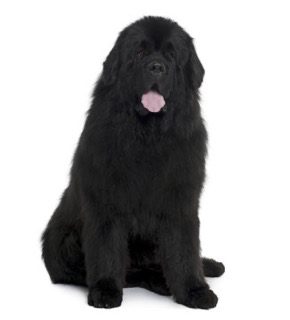
The Newfoundland is a large and powerful working dog that originated from Newfoundland, Canada. The breed has a strong and sturdy build with a thick coat, large bone structure, characteristic webbed feet, and a muscular tail that can be curled up over their back. Their distinctively long, thick and woolly coat can come in many colors such as black, brown, and white. Other colors and markings are seen as well, such as grey, tan, and brindle. The head has a broad, flat skull with drop ears and a wide nose.Their eyes are usually a dark brown or black. They likely came from a mix of several types of breeds, including the St. John’s Water Dog, the Labrador Retriever, and the Greater Newfoundland. What makes this breed unique is their giant size, athleticism, intelligence, and their loyalty as a family companion. As a working dog, they can excel at a variety of tasks such as drafting, carting, rescue, water work, and therapy work.
The Newfoundland is an incredibly gentle and friendly breed of dog. This breed is known for its intelligence and playfulness, as well their willingness to patiently put up with all sorts of activities from small children. It is an ideal breed for those who want a dog that is both loyal and tolerant. Newfoundlands get along well with other dogs and pets, and are especially well-suited to households with children. From an early age, consistent training and socialization will help to ensure your Newfoundland grows up to be a well-adjusted companion. In regards to activity needs, this breed has moderate energy levels, requiring regular walks, runs and playtime to remain healthy and content. Usually, living indoors is suitable for the Newfoundland, as long as they get enough exercise and mental stimulation. Though not excessively noisy, Newfoundlands may bark occasionally, usually to alert an owner of approaching strangers. This breed will form a strong bond with its family, and respond best to positive reinforcement and praise.
Newfoundland dogs are large, muscular breeds that need a lot of exercise and proper nutrition. A healthy diet of nutrient-rich foods and treats, specific to the breed, is an essential part of owning a Newfoundland. Foods such as lean proteins, complex carbohydrates, whole grains, and fresh vegetables are all great options that provide essential vitamins, minerals, and fatty acids that help keep Newfoundlands healthy. Treats should be given sparingly to prevent obesity and other health problems. The necessary fats and carbohydrates should come from healthy sources as opposed to processed foods. Responsible dog ownership includes making sure your Newfie is eating a balanced diet and is getting plenty of exercise. To learn more about the nutritional requirements and feeding guidelines of Newfoundland dogs, check out Way Canina. Through this platform, you can find out what foods your Newfie can have and which ones to avoid. Remember, a healthy diet is essential for any dog to stay happy and healthy.
In order to keep your Newfoundland healthy, it is important to bring him or her to regular veterinary check-ups and ensure they are up to date on all necessary vaccinations and preventive care. Grooming is also important for Newfoundland’s, and should include brushing, bathing, and ear cleaning. A balanced diet with portion control and regular exercise is the best way to prevent obesity.
The Newfoundland is a large energetic breed of dog that can weigh between 60 and 150 lbs. They typically have a lifespan of 8-10 years; however, factors such as genetics, diet, exercise, and healthcare can influence their longevity.
If you already own a Newfoundland or are thinking about getting one, it’s important to consider the responsibilities and lifestyle the breed requires. Before deciding, make sure to check out our blog posts and articles on Way Canina to compare different breeds and to find more information about the dog’s lifestyle, needs, and wellbeing.